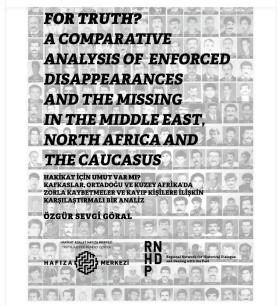ANY HOPES FOR TRUTH? A COMPARATIVE ANALYSIS OF ENFORCED DISAPPEARANCES AND THE MISSING IN THE MIDDLE EAST, NORTH AFRICA AND THE CAUCASUS

Navigating through the academic and civil society debates of the last decade, one would feel that enforced disappearance is a phenomenon of the past, and specifically of the 1970s. Despite the fact that it is reappearing in different forms across the globe, enforced disappearances seem to be discussed less and less over the last ten years. Enforced disappearances, described as a phenomenon of the past essentially implemented against political dissidents in South America during the 1970s, are mostly debated in relation to the old dictatorships of the Southern Cone. This perception, however, is sadly misleading; the practice of forcibly disappearing people has produced a variety of patterns, perpetrators as well as political and legal struggles throughout different spaces and times. Moreover, this practice has unfortunately been widespread during the 20th and the 21st centuries in various places across the world. It has been widely used both by the Organisation de l’Armée Secrète (OAS – French Special Teams of Counter-Insurgency) against anticolonial movements during the Algerian Independence War specifically in 1961 and 1962, and by the Algerian government during the civil war in Algeria;